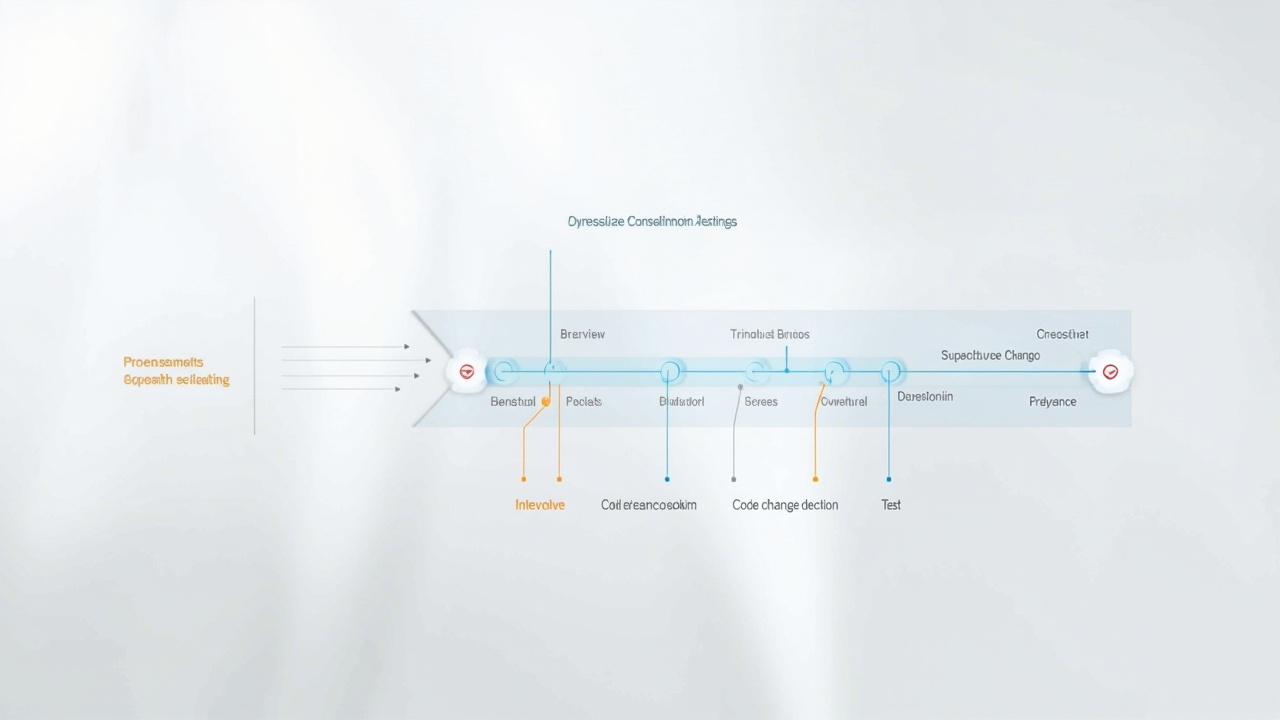The world of software development is continuously evolving, with new tools and methodologies emerging to enhance efficiency and reliability. Among these, unit testing stands as a cornerstone practice, ensuring that individual components of a software system function correctly. Yet, the introduction of novel tools like Genqe promises to revolutionize this process, offering developers a fresh perspective on quality assurance. But what exactly is Genqe, and how does it fit into the landscape of unit testing?
In the realm of software development, the need for robust testing mechanisms cannot be overstated. Developers often face the challenge of ensuring that their code is both functional and resilient to changes. Traditional unit testing frameworks have served well but often require significant manual effort and maintenance. This is where Genqe aims to make a transformative impact.
Genqe, though not widely documented in existing literature, represents a new wave of innovation in the unit testing domain. As developers strive for faster release cycles and higher quality products, Genqe promises to alleviate some of the common pain points associated with traditional unit testing. This article will delve into the intricacies of unit testing with Genqe, exploring its potential benefits, methodologies, and implications for the future of software development.
Understanding Unit Testing: A Foundation for Software Quality

Unit testing forms the backbone of any robust software development process. At its core, unit testing involves verifying the smallest testable parts of an application, known as units, to ensure they function as intended. This section explores the fundamental concepts of unit testing and its significance in software development.
The Essence of Unit Testing
Unit testing is an essential practice that allows developers to test individual components of their software in isolation. By focusing on the smallest parts of an application, developers can ensure that each unit performs correctly before integrating it into the larger system. This granular approach not only helps in catching bugs early in the development cycle but also facilitates easier debugging and maintenance.
“Unit testing is the first line of defense against software defects, ensuring that each component functions as expected.”
Why Unit Testing Matters
The importance of unit testing cannot be overstated. It serves multiple purposes, including
- Early Detection of Bugs: By testing individual units, developers can identify and fix bugs at an early stage, preventing them from escalating into larger issues. Simplified Debugging: When a test fails, developers know precisely which part of the code is responsible, making it easier to diagnose and resolve issues. Documentation of Code: Unit tests serve as a form of documentation, providing insights into the intended functionality of the code.
Challenges in Traditional Unit Testing
Despite its benefits, traditional unit testing can be labor-intensive and time-consuming. Writing comprehensive tests for every unit requires significant effort, and maintaining these tests as the codebase evolves can be daunting. This is where tools like Genqe come into play, offering solutions to streamline the unit testing process.
As we transition to exploring Genqe in the next section, it’s crucial to understand how it addresses these challenges and what sets it apart from traditional tools.
Introducing Genqe: A New Paradigm in Unit Testing

Genqe is positioned as a groundbreaking tool in the realm of unit testing, aiming to simplify and enhance the testing process. This section unveils what makes Genqe unique and how it integrates with existing development workflows.
What is Genqe?
Genqe is an innovative tool designed to revolutionize unit testing by automating and optimizing various aspects of the testing process. Unlike conventional unit testing frameworks, Genqe leverages advanced algorithms and machine learning techniques to generate test cases, analyze code coverage, and predict potential areas of failure.
“Genqe is not just a tool it’s a catalyst for change in how developers approach unit testing.”
Key Features of Genqe
Genqe offers a suite of features that set it apart from traditional unit testing tools
- Automated Test Case Generation: Genqe automates the creation of test cases, reducing the manual effort required from developers. Dynamic Code Analysis: It provides real-time analysis of code changes, ensuring that tests remain relevant and effective. Predictive Analytics: By analyzing historical data, Genqe predicts potential failure points, allowing developers to proactively address issues.
Integration with Existing Workflows
One of Genqe’s strengths lies in its seamless integration with existing development environments. It supports popular programming languages and frameworks, ensuring that developers can incorporate it into their workflows without significant disruptions.
Transitioning to the next section, we will delve deeper into how Genqe facilitates automated test case generation and what this means for developers.
Automated Test Case Generation: The Genqe Advantage

One of the most compelling aspects of Genqe is its ability to automate the generation of test cases. This section explores how this feature works and the benefits it brings to developers.
The Power of Automation
Automated test case generation is a game-changer in the unit testing landscape. Traditionally, developers spend a significant amount of time writing test cases, ensuring they cover all possible scenarios. Genqe automates this process, using sophisticated algorithms to generate comprehensive test cases with minimal input from developers.
“With Genqe, developers can focus more on coding and less on manual test creation.”
Benefits of Automated Test Cases
The automation of test case generation offers several advantages
- Time Efficiency: By automating test case creation, developers can save valuable time and allocate resources to other critical tasks. Comprehensive Coverage: Genqe’s algorithms ensure that test cases cover a wide range of scenarios, enhancing the reliability of the software. Reduced Human Error: Automated generation minimizes the risk of human error, resulting in more accurate and reliable test cases.
Practical Implementation
Implementing automated test case generation with Genqe is straightforward. Developers can set parameters and let Genqe’s algorithms handle the rest, ensuring that their code is thoroughly tested without manual intervention.
As we move to the next section, we will examine how Genqe’s dynamic code analysis complements automated test case generation to provide a holistic testing solution.
Dynamic Code Analysis: Enhancing Test Relevance

Genqe’s dynamic code analysis feature ensures that tests remain relevant and effective as the codebase evolves. This section delves into how this feature works and its impact on the development process.
Keeping Tests Relevant
Codebases are not static; they evolve with each iteration and update. Genqe addresses this challenge by offering dynamic code analysis, which continuously monitors code changes and updates test cases accordingly. This ensures that tests are always aligned with the latest version of the code.
“Dynamic code analysis with Genqe ensures that tests evolve alongside the code, maintaining their relevance and effectiveness.”
How Dynamic Analysis Works
Genqe’s dynamic code analysis operates by
- Monitoring Code Changes: It tracks changes in the codebase and identifies areas that require updated or new test cases. Adaptive Testing: Test cases are adapted based on recent code modifications, ensuring that they remain comprehensive and relevant. Continuous Feedback: Developers receive real-time feedback on how code changes impact existing tests, allowing for immediate adjustments.
Impact on Development Workflow
Dynamic code analysis with Genqe significantly enhances the development workflow by
- Reducing Technical Debt: By keeping tests updated, Genqe minimizes the accumulation of outdated tests that can lead to technical debt. Improving Code Quality: Continuous analysis and adaptation of tests contribute to higher overall code quality and reliability. Facilitating Agile Practices: Genqe’s real-time feedback aligns well with agile development practices, enabling rapid iteration and improvement.
In the next section, we will explore Genqe’s predictive analytics capabilities and their role in identifying potential failure points.
Predictive Analytics: Anticipating Failures Before They Occur

Predictive analytics is a standout feature of Genqe, offering developers insights into potential failure points. This section explores how predictive analytics works and its benefits for software development.
The Science of Prediction
Genqe leverages predictive analytics to anticipate where and how failures might occur in the code. By analyzing historical data and patterns, Genqe identifies areas of the codebase that are prone to errors, enabling developers to address these issues proactively.
“Genqe’s predictive analytics transforms risk management from reactive to proactive, enhancing software reliability.”
Benefits of Predictive Analytics
Predictive analytics provides several advantages for developers
- Proactive Risk Management: By identifying potential failure points early, developers can mitigate risks before they manifest in production. Informed Decision-Making: Developers gain insights into the most vulnerable areas of their code, allowing them to prioritize testing efforts effectively. Enhanced Software Reliability: Addressing potential issues before they occur leads to more robust and reliable software.
Implementation and Use Cases
Implementing predictive analytics with Genqe is straightforward. Developers can access predictive insights through Genqe’s interface, using them to guide testing strategies and improve code quality. This feature is particularly beneficial in complex projects where identifying potential failure points manually can be challenging.
As we transition to the next section, we will discuss how Genqe’s comprehensive testing solution supports agile development methodologies.
Supporting Agile Development with Genqe

Agile development methodologies emphasize flexibility, collaboration, and rapid iteration. Genqe supports these principles by providing a comprehensive testing solution that integrates seamlessly with agile practices.
Aligning with Agile Principles
Agile methodologies prioritize adaptability and quick delivery, making effective testing crucial. Genqe’s features align with these principles by offering
- Rapid Feedback Loops: Real-time analysis and automated testing ensure that developers receive immediate feedback on their code. Continuous Integration Support: Genqe integrates with continuous integration pipelines, facilitating frequent and reliable code deployments. Collaboration and Transparency: Genqe’s intuitive interface promotes collaboration among team members, providing visibility into testing processes and results.
“Genqe empowers agile teams to deliver high-quality software swiftly, without compromising on testing rigor.”
Enhancing Agile Workflows
Genqe enhances agile workflows by
- Reducing Cycle Times: Automated testing and dynamic analysis reduce the time required to validate code changes, accelerating development cycles. Improving Team Efficiency: By automating repetitive tasks, Genqe allows team members to focus on more strategic activities, improving overall efficiency. Facilitating Continuous Improvement: The insights provided by Genqe support continuous improvement efforts, enabling teams to refine processes and deliver better products.
Real-World Applications
Many organizations have successfully integrated Genqe into their agile workflows, experiencing improvements in both speed and quality. These real-world applications demonstrate Genqe’s ability to enhance agile development practices effectively.
In the concluding section, we will summarize the key insights from this exploration of unit testing with Genqe and offer a call-to-action for readers to delve deeper into this innovative tool.
Conclusion: Embracing the Future of Unit Testing with Genqe

As we’ve explored throughout this article, Genqe represents a significant advancement in the field of unit testing, providing developers with powerful tools to enhance their testing processes. From automated test case generation to dynamic code analysis and predictive analytics, Genqe offers a comprehensive solution that aligns perfectly with modern development practices.
In today’s fast-paced software development landscape, the ability to deliver high-quality products quickly is paramount. Genqe empowers developers to achieve this by automating tedious tasks, providing real-time feedback, and offering insights into potential risks. By integrating Genqe into their workflows, development teams can embrace a future where unit testing is not just a necessity but a strategic advantage.
As you consider the potential of Genqe for your own projects, we invite you to further explore its capabilities and see how it can transform your approach to unit testing. The future of software assurance is here, and with Genqe, you’re poised to lead the charge.
In conclusion, while Genqe might be a relatively new player in the unit testing arena, its innovative features and alignment with modern development practices make it a tool worth exploring. As you navigate the ever-evolving world of software development, consider how Genqe can enhance your unit testing efforts and contribute to your project’s success.
Explore More on This Topic
Interested in diving deeper into this subject? Connect with experts or explore additional resources to expand your understanding.
If the link above does not work, please visit: https://calendly.com/dm-csimplifyit/30min?month=2025-05